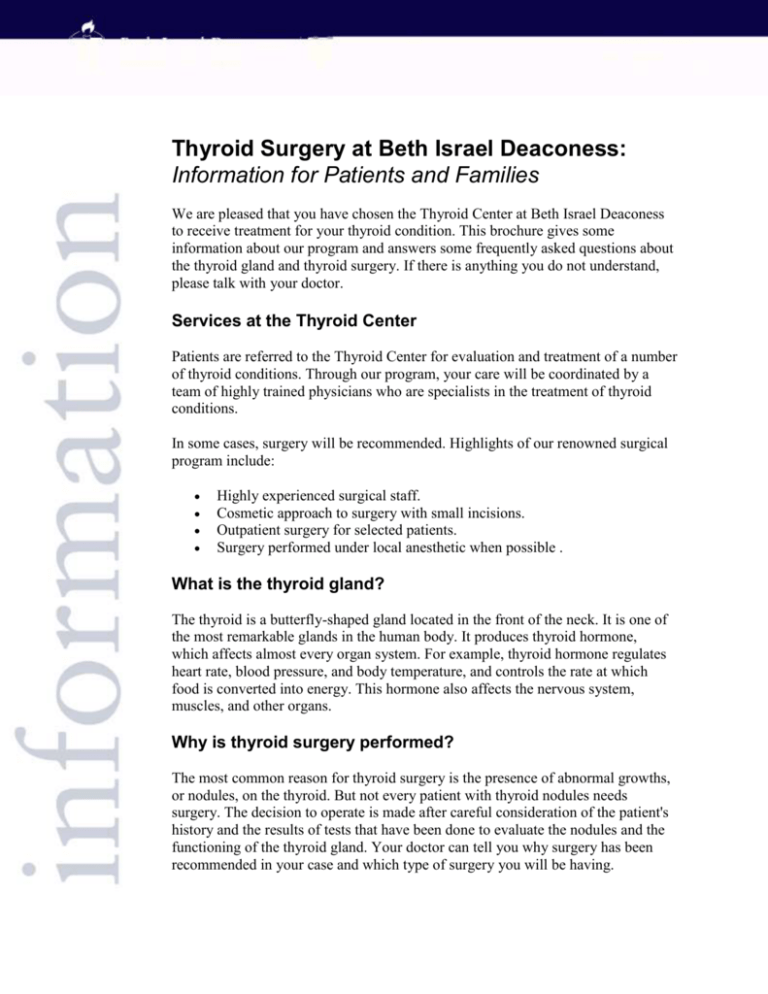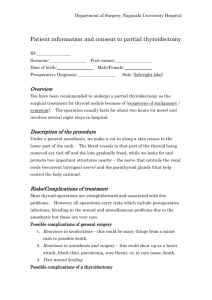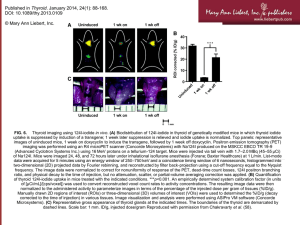
Thyroid Surgery at Beth Israel Deaconess:
Information for Patients and Families
We are pleased that you have chosen the Thyroid Center at Beth Israel Deaconess
to receive treatment for your thyroid condition. This brochure gives some
information about our program and answers some frequently asked questions about
the thyroid gland and thyroid surgery. If there is anything you do not understand,
please talk with your doctor.
Services at the Thyroid Center
Patients are referred to the Thyroid Center for evaluation and treatment of a number
of thyroid conditions. Through our program, your care will be coordinated by a
team of highly trained physicians who are specialists in the treatment of thyroid
conditions.
In some cases, surgery will be recommended. Highlights of our renowned surgical
program include:
Highly experienced surgical staff.
Cosmetic approach to surgery with small incisions.
Outpatient surgery for selected patients.
Surgery performed under local anesthetic when possible .
What is the thyroid gland?
The thyroid is a butterfly-shaped gland located in the front of the neck. It is one of
the most remarkable glands in the human body. It produces thyroid hormone,
which affects almost every organ system. For example, thyroid hormone regulates
heart rate, blood pressure, and body temperature, and controls the rate at which
food is converted into energy. This hormone also affects the nervous system,
muscles, and other organs.
Why is thyroid surgery performed?
The most common reason for thyroid surgery is the presence of abnormal growths,
or nodules, on the thyroid. But not every patient with thyroid nodules needs
surgery. The decision to operate is made after careful consideration of the patient's
history and the results of tests that have been done to evaluate the nodules and the
functioning of the thyroid gland. Your doctor can tell you why surgery has been
recommended in your case and which type of surgery you will be having.
How long will I be in the hospital for thyroid surgery?
You will be admitted to the hospital on the morning of your surgery. Some patients
are able to go home the same day after about 8 hours in the recovery room. Others
stay overnight in the hospital. A bed is reserved for you to spend the night in case it
is needed.
What is done during thyroid surgery?
There are several different procedures that may be done during thyroid surgery, as
listed here. Your surgeon can tell you what your operation will involve.
Thyroid lobectomy - One half of the thyroid is removed.
Total thyroidectomy - The entire thyroid gland is removed.
Lymph node dissection - Some of the lymph nodes around the thyroid
gland are removed.
What type of anesthesia will I have?
Most patients have general anesthesia for thyroid surgery. With general anesthesia,
you are completely asleep during the operation.
In some cases, thyroid surgery can be done using a local anesthetic. With this
approach, you are awake but very sleepy from sedatives given through an
intravenous (IV) line. Local anesthetic (similar to Novocaine) is injected into the
neck so that you do not feel any pain during the surgery.
You will meet with an anesthesiologist before your surgery who will talk with you
about the type of anesthesia you will have.
What must I do to prepare for surgery?
You will be scheduled for a pre-operative interview with a nurse. In some cases,
you will have to come to the hospital for this interview and for any other tests that
may be necessary, such as blood tests, X-rays, or an EKG. In other cases, the
interview can be done over the phone. Your surgeon's office will give you more
information about your pre-operative interview. If you are coming to the hospital
for the interview, you will meet an anesthesiologist at that time. If your interview is
over the phone, you will meet an anesthesiologist on the morning of your surgery.
During your pre-operative interview, the nurse will explain what you need to do in
order to prepare for your surgery. Make sure you understand all of the instructions
you are given.
Will I have pain after the operation?
You will have some pain, but this can be treated very effectively with pain
medicine. As you recover, you may have a sore throat, difficulty swallowing, or a
hoarse voice. These things will get better in a short time.
What medicines will I have to take at home after surgery?
In most cases, you will go back to taking any daily medicines you were on before
surgery. As noted above, pain medicine will be added for a few days. Sometimes,
additional medicines are needed, including:
Calcium and Vitamin D - Your blood calcium level is controlled by the
parathyroid glands, which are near the thyroid. Sometimes, these glands do
not work properly after surgery and calcium levels are abnormal. Your
surgeon may recommend that you take calcium and vitamin D supplements
after surgery. Usually, these can be stopped after a time. Rarely, they must
be taken permanently.
Thyroid hormone - If the entire thyroid gland has been removed, you will
have to take thyroid hormone for the rest of your life. If you had a thyroid
lobectomy, you may or may not have to take thyroid hormone. If you took
thyroid hormone before the surgery, it is likely that you will continue to
take it. Your surgeon will be able to tell you whether or not you can expect
to take thyroid hormone following your operation.
What is done with the thyroid tissue that is removed?
The tissue is sent to the lab for examination. A pathologist will look at the tissue
under a microscope to see if there are any abnormalities, including cancer. It takes
about 5 business days to get these results after your operation. Your surgeon will go
over the results in detail with you when you come back for your follow-up
appointment.
How will I feel after the surgery?
You will be somewhat sore and will have trouble moving your neck normally for
about a week. As noted above, pain medication is effective in controlling this
discomfort. Some patients may have muscle spasms in the upper back and neck. It
will be important for you to keep these muscles relaxed and to maintain normal
posture as much as possible to reduce these spasms.
You should feel better every day. Most patients can return to work 1-2 weeks after
surgery. You should be able to drive in about a week - as long as you can turn your
head comfortably and are not taking pain medicine. You can swim and return to
non-strenuous exercise (tennis, golf, walking, treadmill) after 2 weeks. You can
return to all your normal activities by 3-4 weeks after surgery.
Will I lose my voice after thyroid surgery?
Your voice will sound different for a while after the surgery. Some patients are
hoarse, some have "voice fatigue," meaning their voice is "tired" at the end of the
day. In most cases, these changes go away in 6-8 weeks.
In a small number of patients (about 1%), changes in the voice are permanent. If
this happens, treatments are available that may help improve the quality of the
voice.
Are there other side effects of surgery?
As noted above, in some cases the parathyroid glands do not work properly after
thyroid surgery, causing blood calcium levels to drop. You may be asked to watch
for signs of low calcium, which include numbness and tingling in the fingers and
around the mouth or muscle cramps. Your surgeon will tell you what to do if low
calcium becomes a problem. You may need to take additional calcium if this
happens.
Will I have a scar in my neck?
You will have a scar, but we take great care to make sure it is as small as possible.
Plastic type closures are used to minimize scarring. The incision is placed in the
lower neck. Your incision will be closed with stitches placed under your skin that
are not visible. These stitches dissolve after a period of time and do not need to be
removed. Everyone's body heals differently, so not everyone who has the same
surgery will have the same type of scar. In the early weeks and months following
your surgery, the scar will be much more noticeable than it will be later. It is
natural to get some swelling around the scar, and to see a healing "ridge" form
above and below the area. A small amount of bruising is normal as well. Over time,
the scar will fade. It may take up to 6 months, but in most cases the scar lightens to
where it is barely noticeable. The majority of people having thyroid surgery are
very pleased with the minimal scar present at 6 months after surgery.
This material was developed by clinicians at the Thyroid Center at Beth Israel Deaconess Medical Center. It is produced and
distributed by the Beth Israel Deaconess Learning Center. © 2007, Beth Israel Deaconess Medical Center. All rights
reserved. MC0830 1/07








